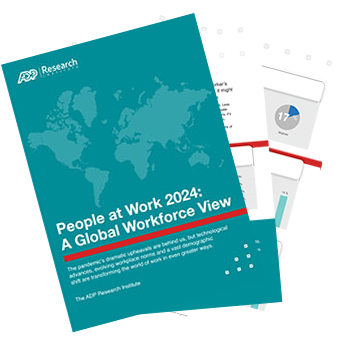
People at Work: A Global Workforce View
For the past four years, ADP Research has surveyed workers around the globe to learn about their on-the-job experiences. This work has illuminated the world’s journey through a deep economic downturn, the subsequent cost-of-living crisis and monumental change tied to remote and hybrid work. As we’ve passed each of these milestones, People at Work has captured how the global labour force has adapted and changed. The world is shaking off its pandemic-driven upheaval, but change hasn’t slowed. As new opportunities and challenges reshape the labour market, workers in some ways have remained constant in their priorities—they still put great value on remuneration and job security, for example. But in other ways, they feel under threat from technology, stress and shifting workplace norms.
Using detailed survey responses from more than 34,000 workers in 18 countries, People at Work continues to capture this evolution. In 2024, we uncovered six key themes.
People at Work 2024: A Global Workforce View
Country highlights
Australia
Workers in Australia are less likely to value job security (42%) than their counterparts across the Asia Pacific region (51%), but they are much more likely to value flexibility of hours. Seventy-six percent are satisfied with the job security afforded by their employer, a much smaller share than globally (81%) and across Asia Pacific (83%). And employers in Australia could do more to provide their staff with financial wellbeing advice – only 43% of respondents say they receive this information, significantly trailing the region (67%) and workers globally (61%). Workers also are much less likely to be recognised for their contributions.
China
Workers in China prize job security highly, and 84% of employees say they’re satisfied with their level of job security. That’s one of the largest groups of any country. They’re less likely than workers in any other country to feel underpaid for the work they do, and only 13%—the smallest share in Asia Pacific—are actively trying to change jobs. Half say they have never been underpaid, a large share when compared to the region and workers globally (both 38%). While a small share of people in China (8%) experience stress at work every day, women are much more likely (42%) than men (27%) to report that they suffer from job-related mental health issues.
India
Workers in India report the greatest workplace flexibility, but 76% say they suffer from on-the-job stress, the largest share of any country in our survey. More than 48% think their work is suffering due to poor mental health, the largest share of any country. More than 40% say they have two or more sources of income, also a record large share. It might be no surprise, then, that workers in India are more likely to say they’re trying to change jobs. Yet these same workers also report the highest levels of satisfaction in their current employment - 81% - the largest share of any country.
Japan
Of all countries surveyed, Japan has the smallest share of satisfied workers (46%). In fact, among all workers in Asia Pacific countries, those in Japan are more likely to say they’re unhappy with their career progression, gender pay equity, environmental stewardship and employer attention to their contributions and financial and mental wellbeing. Japan also has the largest gender gap when it comes to satisfaction with pay, on-the-job recognition, mental wellbeing, and feeling safe at work, with women far more likely to report feeling satisfied in these areas than men. Still, more than half of workers in Japan say they haven’t considered a career change in the past year, the largest share by far of any country.
Singapore
Workers value salary in Singapore (71%) more than anywhere else we surveyed. But less than half of workers are satisfied with what they earn, a small share when compared to the region (67%) and globally (65%). Nearly 81% of workers in Singapore have only one source of income, the largest share of any Asia Pacific country, and a relatively large share (27%) say they feel insecure in their jobs. Workers in Singapore are much less likely than their regional and global counterparts to report that their employers have become better at gender pay equality, environmental stewardship and diversity. Interestingly, although Australians say they’re most prone to stress, experiencing it on average 12 times per week, they’re least disposed to say that it adversely affects their work (57% say so). Whereas, in the next most stressed Asia Pacific nation – India – where workers experience stress 11 times per week, 76% say it affects their work. While 24% of Australians and 21% of Singaporeans say their employer doesn’t participate in DEI initiatives, this falls to just 11% in China and 6% in India.
Articles

insight
Revealed: the factors that influence employees’ flexible working options

insight
ADP’s research results: we need to talk about men at work
Asia Pacific by the numbers
Discover all our studies
People at Work: A Global Workforce View
One of the largest international studies of its kind, canvassing the views of over 34,000 workers in 18 countries, our research provides HR leaders with unique insights into the employee experience — people’s attitudes, aspirations, wants and needs.

People at Work 2023
Discover insights to better understand, motivate and retain your people.
People at Work 2023
Discover insights to better understand, motivate and retain your people.

People at Work 2022
Discover key insights to stay competitive and motivate your employees.
People at Work 2022
Discover key insights to stay competitive and motivate your employees.

People at Work 2021
Discover global worker insights a year on from the start of COVID-19.
People at Work 2021
Discover global worker insights a year on from the start of COVID-19.
Get your report now - discover key insights to better understand your workforce and transform your business.

 1. What workers want: pay—and more
1. What workers want: pay—and more
 2. What workers expect: pay increases
2. What workers expect: pay increases
 3. The promise and peril of remote work
3. The promise and peril of remote work
 4. ESG and DEI: a workforce divided
4. ESG and DEI: a workforce divided
 5. Career development: room for improvement
5. Career development: room for improvement
 6. Stress, the constant companion
6. Stress, the constant companion






